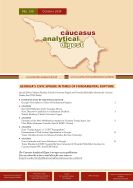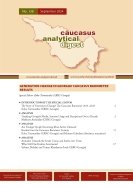Caucasus Analytical Digest (CAD)
The Caucasus Analytical Digest (CAD) is a bimonthly internet publication jointly produced by the external page Caucasus Research Resource Center (CRRC-Georgia), the external page Research Centre for East European Studies (FSO) at the University of Bremen, the Center for Security Studies (CSS) at ETH Zürich, the external page Center for Eastern European Studies (CEES) at the University of Zurich and the external page German Association for East European Studies (DGO). The Caucasus Analytical Digest analyzes the political, economic, and social situation in the three South Caucasus states of Armenia, Azerbaijan and Georgia within the context of international and security dimensions of this region’s development. The CAD is edited by external page Lusine Badalyan, external page Sandra Fernandes, external page Farid Guliyev, external page Diana Lezhava, external page Lili Di Puppo, external page Jeronim Perović, external page Abel Polese, external page Koba Turmanidze.
The CAD corresponding editors are and (co-editor), and the layout editor is .
All Issues
chevron_right All CAD IssuesCurrent Issues

No. 139: Georgia's Civic Sphere in Times of Fundamental Rupture
This special issue aims to contextualize the enactment of the law "on transparency of foreign influence,” or the “foreign agents law,” in Georgia with a particular focus on the institutional and discursive dynamics as well as the protest mobilizations that have emerged in response. The contributions in this issue examine four interconnected topics: Georgia’s state-NGO relations amid democratic backsliding; dynamics of protests and practices of interactions related to inclusion and exclusion; governmental discourses and moral defamation of civil society and the LGBTQI community; protest attitudes and behavior between 2023 and 2024.

No. 138: Generation Change in Georgia? Caucasus Barometer Results
This issue addresses the debate on whether we are witnessing a relatively rapid and substantial shift in attitudes in Georgia, particularly among the youth. It does so by analysing data from the Caucasus Barometer survey, the most extensive publicly available study of public opinion in the region. The contributions in this issue examine three interconnected topics: media consumption patterns (use of and trust in different sources of information), attitudes toward political participation (including attitudes to democracy), and perceptions of the past (focusing on the Soviet Union and, separately, Stalin as leader).